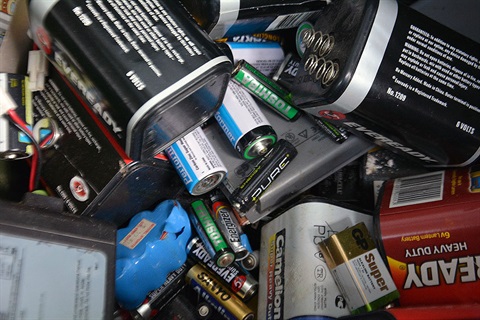Be battery aware for Bulky Waste Drop Off
Published on 25 February 2025

Kiama has long been the “little council that could” when it comes to waste.
We were an early adopter of FOGO, with more than 4,800 tonnes of domestic organics collected yearly, with admirably low contamination rates. Our community bins an average of 2,150 tonnes of recycling and sends a little over 2,600 tonnes of waste to landfill per year. For our waste collection events, our resource recovery rate ranges from 50 to 75 per cent.
Council’s Manager of Waste Services Guy Stearn says the Kiama Community is “a good sort” – by which he means our residents are generally well educated and willing to do the right thing when it comes to sorting and disposing of their waste.
However in the past 12 months, Kiama Council, like many other local authorities Australia-wide has seen a steep increase in waste fires. These are generally attributable to lithium-ion (Li-Ion) batteries, which are included in an increasing number of everyday items, and then incorrectly disposed of, often due to a lack of awareness.
Kiama’s waste department has dealt with two significant fires in the past 12 months. One at our Minnamurra Waste and Recycling Facility (Waste Depot) and one in a recycling truck. In both instances thankfully no one was hurt and procedures were followed correctly. However incidents such as this are always learning opportunities.
Dovetailing with a Council-wide workplace health and safety focus in 2024-2026, our Waste Team is undertaking additional staff training and awareness around safety issues and waste management. We’ve improved processes in and around how we handle our waste and conduct our jobs at the Minnamurra Depot. This includes better risk assessment procedures and incident reporting.
The results are noticeable, says Mr Stearn: “Staff have been impressed with how we’ve responded to critical incidents and they’ve really welcomed the additional training provided. We’ve also seen an increased awareness and focus on safety, plus a high uptake of more safety-conscious procedures,” Mr Stearn said.
In anticipation of March’s Household Bulky Waste Drop Off (a twice-yearly nine-day event held at the Minnamurra Depot) our Waste and Cleaning staff will receive an additional four-hour training session on safety.
Community participants booking a timeslot for this year’s event have been provided with updated terms and conditions on what can and can’t be disposed and Council is working hard to raise the general awareness about battery disposal, among other issues.
“Many people may not realise that a Li-Ion battery is embedded in something like a children’s toy, an electric toothbrush or even their Christmas lights,” said Mr Stearn. “People think they’re doing the right thing by getting rid of battery-powered items once they get old or stop working, which they are, but it’s a big no-no to throw them in with your kerbside bins,” he says.
Council’s Waste Management Officer Josephine St John says: “Our Household Bulky Waste event has been embraced by the Kiama community. The event is a great opportunity for our residents to dispose of their unwanted items safely and responsibly.”
“There’s also our hugely popular Up4Grabs shed -- Kiama’s biggest ‘trash or treasure’ giveaway, which sees thousands of unwanted items re-homed rather than going into landfill. This a great opportunity for community members attending the Bulky Waste event to grab a second-hand item such as surfboards, bicycles, furniture, books, camping gear and other household items,” Ms St John says.
Council’s website has been updated with information on what can and can’t be disposed of and we’re raising awareness via our social media channels on the dangers of incorrect battery disposal.
Guy Stearn says: “Our teams on the ground are trained and ready to go, but we need all of our community members to stay vigilant and correctly dispose their batteries and other items to ensure another successful and safe Bulky Waste drop off. See you there!”